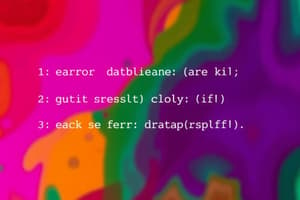Podcast
Questions and Answers
What is the primary purpose of a try-catch block in programming?
What is the primary purpose of a try-catch block in programming?
- To perform arithmetic operations.
- To manage memory allocation.
- To handle runtime errors. (correct)
- To define functions.
Which of the following illustrates the use of short-circuiting to prevent a runtime error?
Which of the following illustrates the use of short-circuiting to prevent a runtime error?
- if (a != 0 && b / a > 2) {...} (correct)
- if (a == 0 || a / b > 2) {...}
- if (a / b > 2 && a != 0) {...}
- if (b != 0 && (a + b) > 10) {...}
What most accurately describes the difference between initialization and assignment?
What most accurately describes the difference between initialization and assignment?
- Both initialization and assignment mean the same thing.
- Initialization updates the variable, while assignment only provides an initial value.
- Initialization provides an initial value, while assignment updates the variable's value. (correct)
- Initialization occurs at compile time, while assignment occurs at runtime.
Which rule of operations helps dictate the order in which expressions are evaluated?
Which rule of operations helps dictate the order in which expressions are evaluated?
To effectively handle type conversion overflow, what strategy should a programmer ideally use?
To effectively handle type conversion overflow, what strategy should a programmer ideally use?
What is the purpose of error handling in programming?
What is the purpose of error handling in programming?
What type of error occurs due to incorrect program logic but does not crash the program?
What type of error occurs due to incorrect program logic but does not crash the program?
In which type of language is lazy evaluation commonly found?
In which type of language is lazy evaluation commonly found?
Which statement about operator overloading in C++ is true?
Which statement about operator overloading in C++ is true?
What type of language checks types at runtime?
What type of language checks types at runtime?
What does aliasing mean in programming?
What does aliasing mean in programming?
What type of assignment allows a value to be assigned to multiple variables at once?
What type of assignment allows a value to be assigned to multiple variables at once?
Which language features a safe navigation operator?
Which language features a safe navigation operator?
Which is an example of user-friendly error handling in web applications?
Which is an example of user-friendly error handling in web applications?
What is an expression in programming?
What is an expression in programming?
In which of the following expressions is type coercion most likely to occur?
In which of the following expressions is type coercion most likely to occur?
What is the role of an assignment statement in programming?
What is the role of an assignment statement in programming?
Strict evaluation means:
Strict evaluation means:
Which pattern is useful for operations that may fail temporarily, such as network requests?
Which pattern is useful for operations that may fail temporarily, such as network requests?
In programming, what is the primary difference between syntax and semantics?
In programming, what is the primary difference between syntax and semantics?
In Python, which assignment type allows unpacking values from a sequence into individual variables?
In Python, which assignment type allows unpacking values from a sequence into individual variables?
Flashcards
try-catch block
try-catch block
A programming construct used to handle runtime errors (exceptions).
short-circuiting
short-circuiting
A type of evaluation where the expression is stopped if the result is already known.
order of operations (precedence)
order of operations (precedence)
Rules that dictate the sequence of evaluating operations in an expression.
initialization vs assignment
initialization vs assignment
Signup and view all the flashcards
expression trees
expression trees
Signup and view all the flashcards
User-friendly error handling
User-friendly error handling
Signup and view all the flashcards
Programming expression
Programming expression
Signup and view all the flashcards
Type coercion
Type coercion
Signup and view all the flashcards
Assignment statement
Assignment statement
Signup and view all the flashcards
Strict evaluation
Strict evaluation
Signup and view all the flashcards
Retry logic
Retry logic
Signup and view all the flashcards
Syntax vs. Semantics
Syntax vs. Semantics
Signup and view all the flashcards
Unpacking Assignment
Unpacking Assignment
Signup and view all the flashcards
Logical Error
Logical Error
Signup and view all the flashcards
Lazy Evaluation
Lazy Evaluation
Signup and view all the flashcards
Operator Overloading
Operator Overloading
Signup and view all the flashcards
Dynamic Typing
Dynamic Typing
Signup and view all the flashcards
Syntax Error
Syntax Error
Signup and view all the flashcards
Aliasing
Aliasing
Signup and view all the flashcards
Chained Assignment
Chained Assignment
Signup and view all the flashcards
Short-Circuiting (Logical Operators)
Short-Circuiting (Logical Operators)
Signup and view all the flashcards
Study Notes
Multiple Choice Questions - Principles of Programming Languages
-
Error Handling: User-friendly error messages in web applications provide helpful, easy-to-understand information about errors instead of cryptic error codes.
-
Expressions: An expression in programming is a combination of values, variables, operators, and functions that evaluate to a result.
-
Type Coercion: Type coercion is the implicit conversion of one data type to another, it's most likely to occur when mixing numbers and strings.
-
Assignment Statements: An assignment statement is used to assign the result of an expression to a variable. It's crucial for storing data and results within a program.
-
Strict Evaluation: Strict evaluation ensures that every part of an expression is evaluated before execution proceeds, contrasting with lazy evaluation.
-
Error Handling for Temporary Failures: Retry logic, error suppression, and graceful degradation are used for operations that might fail temporarily (e.g., network requests).
Programming Language Concepts
-
Syntax vs. Semantics: Syntax defines the structure of a programming language, and semantics defines its meaning. This is the core difference.
-
Unpacking Assignment: Unpacking assignment allows values from a sequence to be assigned to individual variables simultaneously.
-
Informative Error Messages: Descriptive error messages help developers easily identify the cause and location of an error within a program, allowing them to fix issues more quickly.
-
Logical Errors: Logical errors in a program's logic may not crash the program but can produce incorrect or unexpected results.
-
Lazy Evaluation: Lazy evaluation evaluates expressions only when their values are needed.
-
Operator Overloading: Operator overloading in C++ allows different data types to be used with the same operators.
-
Static vs. Dynamic Typing: Static typing involves checking data types at compile time, whereas dynamic typing checks types at runtime.
-
Safe Navigation Operators: Certain programming languages (e.g. Kotlin) have operators to safely access potentially null object properties (safe navigation).
-
Aliasing: Aliasing occurs when two or more variables refer to the same memory location, meaning changes to one will affect the others.
-
Compound Assignment: Compound assignment allows multiple variables to be assigned a value consecutively.
-
Short-Circuiting: Short-circuiting in programming logic determines when operators are used and when they are not to avoid potential errors.
-
Type Conversion Best Practice: Explicit type conversions are frequently the best practice to avoid conversion bugs.
Studying That Suits You
Use AI to generate personalized quizzes and flashcards to suit your learning preferences.
Related Documents
Description
Test your understanding of key concepts in programming languages with this quiz. Covering topics such as error handling, type coercion, and assignment statements, this set of questions is designed to reinforce your knowledge and application of programming principles.




